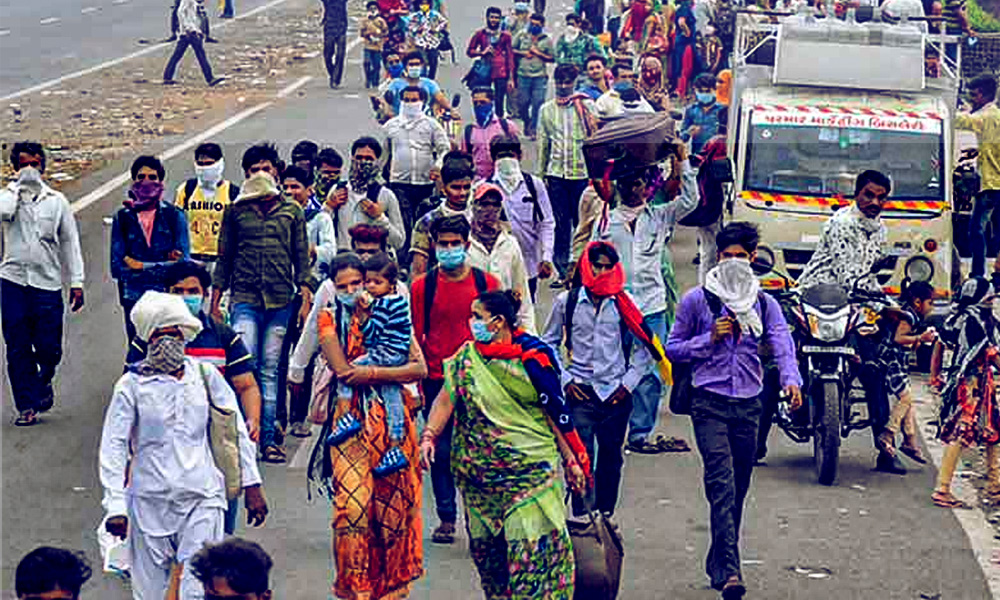
Credits: Webpache
COVID-19 Pandemic Made Indian Billionaires 35% Richer; 1.7 Lakhs Jobs Lost Every Hour In April: Oxfam Report
Writer: Devyani Madaik
A media enthusiast, Devyani believes in learning on the job and there is nothing off limits when it comes to work. Writing is her passion and she is always ready for a debate as well.
India, 25 Jan 2021 2:18 PM GMT | Updated 25 Jan 2021 2:35 PM GMT
Editor : Shubhendu Deshmukh |
Shubhendu, the quint essential news junky, the man who loves science and politics in equal measure and offers the complete contrast to it by being a fan of urdu poetry as well.
Creatives : Rajath
A free spirit who find meaning in life with the virtue of creativity and doing job par its excellence, animal lover and traveller by heart.
"It would take an unskilled worker 10,000 years to make what (Reliance Industries' Chairman Mukesh Ambani) made in an hour during the pandemic, and three years to make what Ambani made in a second," the report read.
A recent report by non-profit global organisation Oxfam has revealed the aggravating inequality induced due to the coronavirus pandemic.
In its report titled 'The Inequality Virus', Oxfam stated that India's billionaires' wealth increased by an estimated 35 per cent during the lockdown, at a time when 84 per cent of the household faced various degrees of income loss.
The report is to be tabled at the World Economic Forum at Davos in Switzerland.
Nearly 1.7 lakh people lost their jobs every hour, in April 2020 alone. According to the organisation's calculations, the income of the country's top 100 billionaires increased by ₹12.97 trillion since March 2020, enough to give a cheque for ₹94,045 to each of the 138 million poor people.
In contrast, 170,000 people lost their jobs every hour in April 2020, the report points out.
"The rising inequality in the country is poignant. It would take an unskilled worker 10,000 years to make what (Reliance Industries' Chairman Mukesh Ambani) made in an hour during the pandemic, and three years to make what Ambani made in a second," the report read.
It further said that the increase in wealth of the top 11 billionaires of the country during the pandemic could sustain the MGNREGA scheme for 10 years or the health ministry for 10 years.
Inequalities Sectorally
The informal sector workforce remained the worst off due to the outbreak, making up 75 per cent of the 122 million jobs losses. They had fewer opportunities to work from home and suffered more job loss than the formal sector.
Around 40-50 million seasonal migrant workers, working on construction sites, factories etc. were particularly distressed, the report noted.
Education inequalities were also very prevalent. Ever since the classes shifted online, the country saw a vast digital divide. On the other side, private educational technology companies such as BYJU's and Unacademy saw exponential growth. Only 3 per cent of the poorest 20 per cent of Indian households could access a computer and 9 per cent to the internet.
In healthcare, the report stated that since India does not report case data desegregated by socio-economic or social categories, it was difficult to scale the distribution of the disease amongst various communities.
Given that India has the world's second-largest cumulative number of COVID-19 positive cases, poor sanitation and lack of access to primary healthcare services have made the matters worse.
Only 6 per cent of the poorest had access to non-shared sources of improved sanitation, compared to 93 per cent of the top 20 per cent households in India, the report read. Of the marginalised communities, only 37.2 per cent of Scheduled Caste households and 25.9 per cent of Scheduled Tribe households had access to non-shared sanitation facilities, compared to 65.7 per cent for the general population.
The pandemic has also widened gender disparities. The unemployment rate among women was more than men. It rose from 15 per cent before the pandemic to 18 per cent. "This increase in unemployment of women can result in a loss to India's GDP of about 8 per cent or $218 billion," states the report.
According to a survey by the Institute of Social Studies Trust, of the women who retained their jobs, as many 83 per cent faced pay cuts. There was an increase in domestic violence cases as well, with nearly 60 per cent increase up till November 30, 2020.
Oxfam India's findings are a part of the organisation's international report. The report is to be tabled at the World Economic Forum at Davos in Switzerland.
Also Read: Uttar Pradesh Launches Free Coaching Program For UPSC, NEET, JEE Aspirants
 All section
All section














